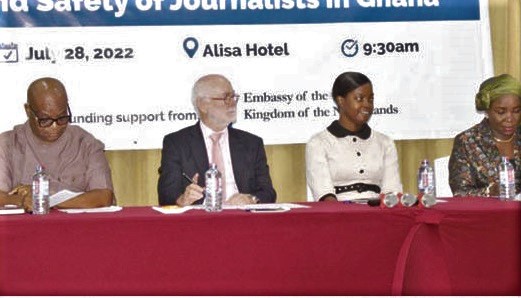
The Media Foundation for West Africa (MFWA) has urged media institutions to implement support systems that will improve the safety of journalists in the country.
A study conducted by the foundation on media professionalism and safety of journalists, policies and practices in newsrooms in the country showed that a number of media organisations did not have institutional support on journalists’ safety.
It revealed that out of the 40 media houses sampled across the 16 regions, only 15 had some semblance of safety for journalists, with only five out of the 15 having insurance packages, while a few had manuals on safety which contained only a sentence or two.
The programme officer of the MFWA, Kwaku Krobea Asante, who presented the six-month study on the state of journalists’ safety policies in the country in Accra yesterday, said the frequency of violations against journalists was due to the absence of safety policies and consciousness on the part of media outlets to ensure the promotion of the safety of their journalists.
Female safety issues could not be assessed, since safety policies were not generally available, even in media houses that had experienced abuse of their staff,” he added.
The study further revealed that four out of five journalists on the field relied on their understanding of the job, friends and the use of their “head” or intuition when confronted with safety issues, while the other journalists spread across 11 media houses said they followed the safety protocols of their organisations.
Perpetrators
It also revealed that the security agencies, including the police, the military, the Immigration Service and intelligence officers were the dominant perpetrators of violence against journalists, followed by political party affiliates.
It is very interesting to know that people who are supposed to provide security or protection for journalists to work were actually those leading in perpetrating violence,” Asante added.
Another trend that was affecting press freedom and the safety of journalists, he said, was the arbitrary arrest of practitioners based on false publications.
On the issue of professionalism, he said after about a year of monitoring some 26 media organisations, his outfit observed some ethical infractions, with local radio stations being the worst offenders.
Although the print media also used misleading headlines and obscene photos and allowed invectives in the comment sections of their news websites, they were a bit careful and appeared more professional in their practice.
As part of its recommendations, the MFWA called on media regulatory bodies and associations to play active roles in ensuring the implementation of safety policies in newsrooms, including insurance packages.
It also said the government must promote the safety and protection of journalists and the media and urged media owners to build the capacity of journalists and presenters on best practices.
There must also be concerted efforts among media stakeholders to ensure that practitioners adhered to ethical standards, it said.
Protection
The Deputy Executive Secretary of the National Media Commission, Alexander Bannermann, said the safety of journalists was paramount and, therefore, “we need to jealously guard our safety”.
For her part, a Deputy Minister of Information, Fatimatu Abubakar, said the government did not support the perpetration of violence against journalists and urged victims of such acts to always report them to the appropriate institutions for action.

